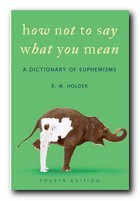how not to say what you mean
Don’t be fooled by the title. The Dictionary of Euphemisms is much more than a collection of polite expressions. It’s also a detailed inventory of slang, sexual code terms, metaphors, evasiveness, underworld argot, and indecent language. The terms are explained, discussed, illustrated, and commented upon in a witty and it has to be said rather dryly satirical manner. The compiler is a business man who has no truck with fashionable political correctness or weak-kneed liberalism, and he takes a particular interest in the way ‘professions’ avoid speaking plainly of their doings. The obvious topics which invoke euphemism are sex, lavatories, drinking, drugs, crime, and death.
 But the not-so-obvious are commerce, politics, warfare, illness, and ideological belief. He gives an explanation of each term, a note on its origin where appropriate, and an example of its use in print. So much one might expect in a serious work of reference, but it is the additional notes which give the book its zest and resonance.
But the not-so-obvious are commerce, politics, warfare, illness, and ideological belief. He gives an explanation of each term, a note on its origin where appropriate, and an example of its use in print. So much one might expect in a serious work of reference, but it is the additional notes which give the book its zest and resonance.
language swear words
A shortened form of bad language:I’ll have no man usin’ language i’ my house. (D.Murray, 1886—he was not a Trappist abbot)
In America language arts is educational and sociological jargon for the ability to speak coherently.
He has no hesitation in exposing the evasions in current political correctness: African-descended = black (never used for Egyptians, Moroccans, or Boers). And he’s particularly good at reminding us of the euphemisms of everyday life:
after-shave = perfume for men;
haute cuisine = small portions of expensive food;
family = not pornographic.
He’s not without a witty turn of phrase:
bestseller a book of which the first impression is not remaindered
consultant a senior employee who has been dismissed
and he’s also good at uncovering military euphemism:
deliver to drop an explosive on an enemy
air support a military attack
Linguistically, it’s amazing how one word can be used for completely opposite meanings, and how many different meanings can be squeezed out of a single word – such as do and go.
There are lots of expressions so common you will hardly think of them as euphemisms – such as happen to in the expression ‘if anything should happen to me’ – meaning ‘to die’.
The latest fourth edition has been revised and updated to include recent coinages, there is a thematic index, and quite an interesting bibliography. This is a browser’s treasure trove. I took it on holiday and after a week’s bad weather had only got as far as letter D. It’s a must-have for anyone interested in language and the way it is used in everyday life.
© Roy Johnson 2008
R.W.Holder, The Oxford Dictionary of Euphemisms, Oxford: Oxford University Press, 4th edition 2008, pp.432, ISBN: 0199235171
DICTIONARIES
More on dictionaries
More on language
More on literary studies
More on grammar